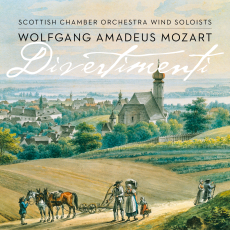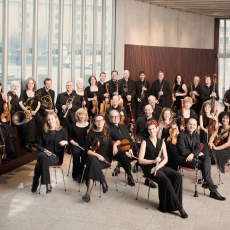SCO Winds - Mozart: Divertimenti - Limelight
Scots put the wind up Mozart - Classical charm and grace define a new ensemble on the block
Although this is a debut recording by the Scottish Chamber Orchestra Wind Soloists, the six players each boast impressive individual track records. As part of the SCO itself, they previously made a recording of wind concerti by Weber, which in turn inspired the creation of the ensemble on this disc.
As the liner notes point out, throughout Mozart's life, one constant was the he always wrote music for entertainment. Whether that music was designed to be played at parties or banquets, at evenings out or formal ceremonies, it's abundantly clear that Mozart took all this good-natured music very seriously.
The recording opens with the Serenade in E Flat, K375. There's a well-known letter to his father in which Mozart describes his delight at discovering the musicians performing the work beneath his window as a surprise one evening. Similarly, the Scottish Chamber Orchestra Wind Soloists present us as listeners with a pleasant surprise, as they (somewhat unusually) play the original version of this work for pairs of clarinets, horns and bassoons. Normally, the Serenade in E flat features a pair of oboes as well, but clarinettists Maximiliano Martin and William Stafford produce some wonderfully shaded timbres, creating more than a strong argument for this earlier version.
The ensemble also performs four of the Divertimenti, originally intended as tafelmusik (table music). It seems incredible to us now that Mozart wrote this divine music for an occasion as straightforward as the Archbishop's dinner, but the player here give this music the respect it deserves.
The Divertimento No 13, K253 is in three movements, with an adventurous theme and variations providing the players with plenty of interesting musical twists and turns. Special mention must go to the Scottish Chamber Orchestra Wind Soloists' use of natural horns, which make a significant difference to the sound. They have such a wonderfully thick timbre, providing a lovely, lush accompaniment to the clarinets' more melodic parts.
The Divertimenti No 14, K270, No 12, K252, and No 9, K240 are all cast in four movements, of varying styles and proportions - Mozart clearly rather enjoyed tweaking and modifying his music within the constraints of the tafelmusik format. Really, though, it's the fine performances that make this recording stand out. The players both allow the music to breathe, but they also add their own personality - listen to the charming clarinet and bassoon accents of the Polonaise from the Divertimento No 12 for an example! Definitely an auspicious debut.




